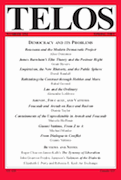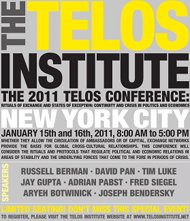By Rahul Govind · Tuesday, April 19, 2011 Rahul Govind’s “Equality, Right, and Identity: Rethinking the Contract through Hobbes and Marx” appears in Telos 154 (Spring 2011). Read the full version at TELOS Online website.
 The following essay is an investigation into the nature of the contract, the way in which the contract indexes “right” and equality, and the textual and historical expressions—as well as echoes—that this has taken from Thomas Hobbes to Karl Marx. The opening set of conceptual remarks lead to a reading of Hobbes’s Leviathan and Marx’s “On the Jewish Question,” arguing that both texts were concerned with theoretically explicating the relationship between right and equality, germane to which was the problematic of the “nation”/community, which was itself conceived via the “Jewish question.” The essay argues that only an attention to Marx’s reformulation of the older problematic, as found in Hobbes, will help us understand the significance of his critique of the (post–)French Revolutionary theory of abstract right, and thereby the need for the development and critique of the field of political economy. Through this exposition of the thread between the conceptualization of the political and political economy, it seeks to reconfigure the canonical texts of Hobbes and Marx in rethinking the interrelations between right, equality, and community within a historico-philosophical horizon. The following essay is an investigation into the nature of the contract, the way in which the contract indexes “right” and equality, and the textual and historical expressions—as well as echoes—that this has taken from Thomas Hobbes to Karl Marx. The opening set of conceptual remarks lead to a reading of Hobbes’s Leviathan and Marx’s “On the Jewish Question,” arguing that both texts were concerned with theoretically explicating the relationship between right and equality, germane to which was the problematic of the “nation”/community, which was itself conceived via the “Jewish question.” The essay argues that only an attention to Marx’s reformulation of the older problematic, as found in Hobbes, will help us understand the significance of his critique of the (post–)French Revolutionary theory of abstract right, and thereby the need for the development and critique of the field of political economy. Through this exposition of the thread between the conceptualization of the political and political economy, it seeks to reconfigure the canonical texts of Hobbes and Marx in rethinking the interrelations between right, equality, and community within a historico-philosophical horizon.
Continue reading →
By Richard R. Weiner · Monday, March 14, 2011 An earlier version of this paper was presented at the 2011 Telos Conference, “Rituals of Exchange and States of Exception: Continuity and Crisis in Politics and Economics.”
 Whereas the new millennium brought with it a focus on “collision rules” within global governance and corporate governance, the economic crises emerging out of 2008 turned the focus to the failure of regulatory practices. The current crises challenge not only a neoliberal hegemony but the New Deal/Great Society coordinating state model as well; as we have moved not only beyond a society of individuals to a society of organizations. We live now in a society of transnational network contracting and corporate governance practices. This society of networks can no longer be clearly associated with traditional conceptions of state, market or civil society/public versus private. Amidst this crisis, emerging legal challenges can no longer be coped with by institutions and ritualized routines of laissez-faire liberalism, social liberalism, or neoliberalism. This paper redirects focus to an increasingly disembedded style of contracting amidst multi-polar and multi-rational regimes of conflict regulation/dispute resolution. In doing so this paper starts from the prism of contracting practices and rituals: arguing that an understanding of how the discourse of “governing contracts” is continually and irreversibly implicated in the evolution of a network of heterarchical private relationships and public institutions. Whereas the new millennium brought with it a focus on “collision rules” within global governance and corporate governance, the economic crises emerging out of 2008 turned the focus to the failure of regulatory practices. The current crises challenge not only a neoliberal hegemony but the New Deal/Great Society coordinating state model as well; as we have moved not only beyond a society of individuals to a society of organizations. We live now in a society of transnational network contracting and corporate governance practices. This society of networks can no longer be clearly associated with traditional conceptions of state, market or civil society/public versus private. Amidst this crisis, emerging legal challenges can no longer be coped with by institutions and ritualized routines of laissez-faire liberalism, social liberalism, or neoliberalism. This paper redirects focus to an increasingly disembedded style of contracting amidst multi-polar and multi-rational regimes of conflict regulation/dispute resolution. In doing so this paper starts from the prism of contracting practices and rituals: arguing that an understanding of how the discourse of “governing contracts” is continually and irreversibly implicated in the evolution of a network of heterarchical private relationships and public institutions.
Continue reading →
|
|
 The following essay is an investigation into the nature of the contract, the way in which the contract indexes “right” and equality, and the textual and historical expressions—as well as echoes—that this has taken from Thomas Hobbes to Karl Marx. The opening set of conceptual remarks lead to a reading of Hobbes’s Leviathan and Marx’s “On the Jewish Question,” arguing that both texts were concerned with theoretically explicating the relationship between right and equality, germane to which was the problematic of the “nation”/community, which was itself conceived via the “Jewish question.” The essay argues that only an attention to Marx’s reformulation of the older problematic, as found in Hobbes, will help us understand the significance of his critique of the (post–)French Revolutionary theory of abstract right, and thereby the need for the development and critique of the field of political economy. Through this exposition of the thread between the conceptualization of the political and political economy, it seeks to reconfigure the canonical texts of Hobbes and Marx in rethinking the interrelations between right, equality, and community within a historico-philosophical horizon.
The following essay is an investigation into the nature of the contract, the way in which the contract indexes “right” and equality, and the textual and historical expressions—as well as echoes—that this has taken from Thomas Hobbes to Karl Marx. The opening set of conceptual remarks lead to a reading of Hobbes’s Leviathan and Marx’s “On the Jewish Question,” arguing that both texts were concerned with theoretically explicating the relationship between right and equality, germane to which was the problematic of the “nation”/community, which was itself conceived via the “Jewish question.” The essay argues that only an attention to Marx’s reformulation of the older problematic, as found in Hobbes, will help us understand the significance of his critique of the (post–)French Revolutionary theory of abstract right, and thereby the need for the development and critique of the field of political economy. Through this exposition of the thread between the conceptualization of the political and political economy, it seeks to reconfigure the canonical texts of Hobbes and Marx in rethinking the interrelations between right, equality, and community within a historico-philosophical horizon.  Whereas the new millennium brought with it a focus on “collision rules” within global governance and corporate governance, the economic crises emerging out of 2008 turned the focus to the failure of regulatory practices. The current crises challenge not only a neoliberal hegemony but the New Deal/Great Society coordinating state model as well; as we have moved not only beyond a society of individuals to a society of organizations. We live now in a society of transnational network contracting and corporate governance practices. This society of networks can no longer be clearly associated with traditional conceptions of state, market or civil society/public versus private. Amidst this crisis, emerging legal challenges can no longer be coped with by institutions and ritualized routines of laissez-faire liberalism, social liberalism, or neoliberalism. This paper redirects focus to an increasingly disembedded style of contracting amidst multi-polar and multi-rational regimes of conflict regulation/dispute resolution. In doing so this paper starts from the prism of contracting practices and rituals: arguing that an understanding of how the discourse of “governing contracts” is continually and irreversibly implicated in the evolution of a network of heterarchical private relationships and public institutions.
Whereas the new millennium brought with it a focus on “collision rules” within global governance and corporate governance, the economic crises emerging out of 2008 turned the focus to the failure of regulatory practices. The current crises challenge not only a neoliberal hegemony but the New Deal/Great Society coordinating state model as well; as we have moved not only beyond a society of individuals to a society of organizations. We live now in a society of transnational network contracting and corporate governance practices. This society of networks can no longer be clearly associated with traditional conceptions of state, market or civil society/public versus private. Amidst this crisis, emerging legal challenges can no longer be coped with by institutions and ritualized routines of laissez-faire liberalism, social liberalism, or neoliberalism. This paper redirects focus to an increasingly disembedded style of contracting amidst multi-polar and multi-rational regimes of conflict regulation/dispute resolution. In doing so this paper starts from the prism of contracting practices and rituals: arguing that an understanding of how the discourse of “governing contracts” is continually and irreversibly implicated in the evolution of a network of heterarchical private relationships and public institutions. 






